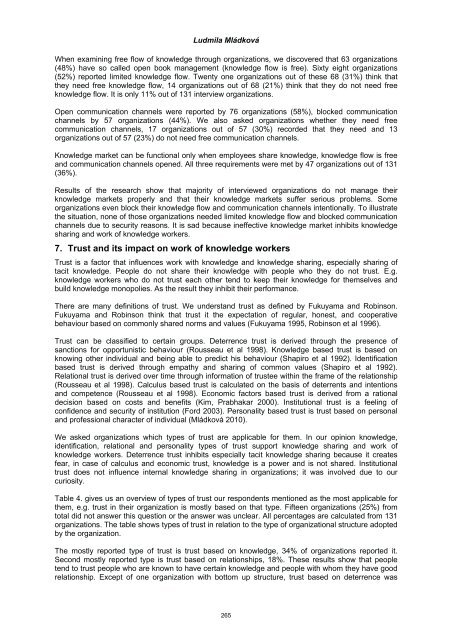Proceedings of the 3rd European Conference on Intellectual Capital
Proceedings of the 3rd European Conference on Intellectual Capital
Proceedings of the 3rd European Conference on Intellectual Capital
You also want an ePaper? Increase the reach of your titles
YUMPU automatically turns print PDFs into web optimized ePapers that Google loves.
Ludmila Mládková<br />
When examining free flow <str<strong>on</strong>g>of</str<strong>on</strong>g> knowledge through organizati<strong>on</strong>s, we discovered that 63 organizati<strong>on</strong>s<br />
(48%) have so called open book management (knowledge flow is free). Sixty eight organizati<strong>on</strong>s<br />
(52%) reported limited knowledge flow. Twenty <strong>on</strong>e organizati<strong>on</strong>s out <str<strong>on</strong>g>of</str<strong>on</strong>g> <str<strong>on</strong>g>the</str<strong>on</strong>g>se 68 (31%) think that<br />
<str<strong>on</strong>g>the</str<strong>on</strong>g>y need free knowledge flow, 14 organizati<strong>on</strong>s out <str<strong>on</strong>g>of</str<strong>on</strong>g> 68 (21%) think that <str<strong>on</strong>g>the</str<strong>on</strong>g>y do not need free<br />
knowledge flow. It is <strong>on</strong>ly 11% out <str<strong>on</strong>g>of</str<strong>on</strong>g> 131 interview organizati<strong>on</strong>s.<br />
Open communicati<strong>on</strong> channels were reported by 76 organizati<strong>on</strong>s (58%), blocked communicati<strong>on</strong><br />
channels by 57 organizati<strong>on</strong>s (44%). We also asked organizati<strong>on</strong>s whe<str<strong>on</strong>g>the</str<strong>on</strong>g>r <str<strong>on</strong>g>the</str<strong>on</strong>g>y need free<br />
communicati<strong>on</strong> channels, 17 organizati<strong>on</strong>s out <str<strong>on</strong>g>of</str<strong>on</strong>g> 57 (30%) recorded that <str<strong>on</strong>g>the</str<strong>on</strong>g>y need and 13<br />
organizati<strong>on</strong>s out <str<strong>on</strong>g>of</str<strong>on</strong>g> 57 (23%) do not need free communicati<strong>on</strong> channels.<br />
Knowledge market can be functi<strong>on</strong>al <strong>on</strong>ly when employees share knowledge, knowledge flow is free<br />
and communicati<strong>on</strong> channels opened. All three requirements were met by 47 organizati<strong>on</strong>s out <str<strong>on</strong>g>of</str<strong>on</strong>g> 131<br />
(36%).<br />
Results <str<strong>on</strong>g>of</str<strong>on</strong>g> <str<strong>on</strong>g>the</str<strong>on</strong>g> research show that majority <str<strong>on</strong>g>of</str<strong>on</strong>g> interviewed organizati<strong>on</strong>s do not manage <str<strong>on</strong>g>the</str<strong>on</strong>g>ir<br />
knowledge markets properly and that <str<strong>on</strong>g>the</str<strong>on</strong>g>ir knowledge markets suffer serious problems. Some<br />
organizati<strong>on</strong>s even block <str<strong>on</strong>g>the</str<strong>on</strong>g>ir knowledge flow and communicati<strong>on</strong> channels intenti<strong>on</strong>ally. To illustrate<br />
<str<strong>on</strong>g>the</str<strong>on</strong>g> situati<strong>on</strong>, n<strong>on</strong>e <str<strong>on</strong>g>of</str<strong>on</strong>g> those organizati<strong>on</strong>s needed limited knowledge flow and blocked communicati<strong>on</strong><br />
channels due to security reas<strong>on</strong>s. It is sad because ineffective knowledge market inhibits knowledge<br />
sharing and work <str<strong>on</strong>g>of</str<strong>on</strong>g> knowledge workers.<br />
7. Trust and its impact <strong>on</strong> work <str<strong>on</strong>g>of</str<strong>on</strong>g> knowledge workers<br />
Trust is a factor that influences work with knowledge and knowledge sharing, especially sharing <str<strong>on</strong>g>of</str<strong>on</strong>g><br />
tacit knowledge. People do not share <str<strong>on</strong>g>the</str<strong>on</strong>g>ir knowledge with people who <str<strong>on</strong>g>the</str<strong>on</strong>g>y do not trust. E.g.<br />
knowledge workers who do not trust each o<str<strong>on</strong>g>the</str<strong>on</strong>g>r tend to keep <str<strong>on</strong>g>the</str<strong>on</strong>g>ir knowledge for <str<strong>on</strong>g>the</str<strong>on</strong>g>mselves and<br />
build knowledge m<strong>on</strong>opolies. As <str<strong>on</strong>g>the</str<strong>on</strong>g> result <str<strong>on</strong>g>the</str<strong>on</strong>g>y inhibit <str<strong>on</strong>g>the</str<strong>on</strong>g>ir performance.<br />
There are many definiti<strong>on</strong>s <str<strong>on</strong>g>of</str<strong>on</strong>g> trust. We understand trust as defined by Fukuyama and Robins<strong>on</strong>.<br />
Fukuyama and Robins<strong>on</strong> think that trust it <str<strong>on</strong>g>the</str<strong>on</strong>g> expectati<strong>on</strong> <str<strong>on</strong>g>of</str<strong>on</strong>g> regular, h<strong>on</strong>est, and cooperative<br />
behaviour based <strong>on</strong> comm<strong>on</strong>ly shared norms and values (Fukuyama 1995, Robins<strong>on</strong> et al 1996).<br />
Trust can be classified to certain groups. Deterrence trust is derived through <str<strong>on</strong>g>the</str<strong>on</strong>g> presence <str<strong>on</strong>g>of</str<strong>on</strong>g><br />
sancti<strong>on</strong>s for opportunistic behaviour (Rousseau et al 1998). Knowledge based trust is based <strong>on</strong><br />
knowing o<str<strong>on</strong>g>the</str<strong>on</strong>g>r individual and being able to predict his behaviour (Shapiro et al 1992). Identificati<strong>on</strong><br />
based trust is derived through empathy and sharing <str<strong>on</strong>g>of</str<strong>on</strong>g> comm<strong>on</strong> values (Shapiro et al 1992).<br />
Relati<strong>on</strong>al trust is derived over time through informati<strong>on</strong> <str<strong>on</strong>g>of</str<strong>on</strong>g> trustee within <str<strong>on</strong>g>the</str<strong>on</strong>g> frame <str<strong>on</strong>g>of</str<strong>on</strong>g> <str<strong>on</strong>g>the</str<strong>on</strong>g> relati<strong>on</strong>ship<br />
(Rousseau et al 1998). Calculus based trust is calculated <strong>on</strong> <str<strong>on</strong>g>the</str<strong>on</strong>g> basis <str<strong>on</strong>g>of</str<strong>on</strong>g> deterrents and intenti<strong>on</strong>s<br />
and competence (Rousseau et al 1998). Ec<strong>on</strong>omic factors based trust is derived from a rati<strong>on</strong>al<br />
decisi<strong>on</strong> based <strong>on</strong> costs and benefits (Kim, Prabhakar 2000). Instituti<strong>on</strong>al trust is a feeling <str<strong>on</strong>g>of</str<strong>on</strong>g><br />
c<strong>on</strong>fidence and security <str<strong>on</strong>g>of</str<strong>on</strong>g> instituti<strong>on</strong> (Ford 2003). Pers<strong>on</strong>ality based trust is trust based <strong>on</strong> pers<strong>on</strong>al<br />
and pr<str<strong>on</strong>g>of</str<strong>on</strong>g>essi<strong>on</strong>al character <str<strong>on</strong>g>of</str<strong>on</strong>g> individual (Mládková 2010).<br />
We asked organizati<strong>on</strong>s which types <str<strong>on</strong>g>of</str<strong>on</strong>g> trust are applicable for <str<strong>on</strong>g>the</str<strong>on</strong>g>m. In our opini<strong>on</strong> knowledge,<br />
identificati<strong>on</strong>, relati<strong>on</strong>al and pers<strong>on</strong>ality types <str<strong>on</strong>g>of</str<strong>on</strong>g> trust support knowledge sharing and work <str<strong>on</strong>g>of</str<strong>on</strong>g><br />
knowledge workers. Deterrence trust inhibits especially tacit knowledge sharing because it creates<br />
fear, in case <str<strong>on</strong>g>of</str<strong>on</strong>g> calculus and ec<strong>on</strong>omic trust, knowledge is a power and is not shared. Instituti<strong>on</strong>al<br />
trust does not influence internal knowledge sharing in organizati<strong>on</strong>s; it was involved due to our<br />
curiosity.<br />
Table 4. gives us an overview <str<strong>on</strong>g>of</str<strong>on</strong>g> types <str<strong>on</strong>g>of</str<strong>on</strong>g> trust our resp<strong>on</strong>dents menti<strong>on</strong>ed as <str<strong>on</strong>g>the</str<strong>on</strong>g> most applicable for<br />
<str<strong>on</strong>g>the</str<strong>on</strong>g>m, e.g. trust in <str<strong>on</strong>g>the</str<strong>on</strong>g>ir organizati<strong>on</strong> is mostly based <strong>on</strong> that type. Fifteen organizati<strong>on</strong>s (25%) from<br />
total did not answer this questi<strong>on</strong> or <str<strong>on</strong>g>the</str<strong>on</strong>g> answer was unclear. All percentages are calculated from 131<br />
organizati<strong>on</strong>s. The table shows types <str<strong>on</strong>g>of</str<strong>on</strong>g> trust in relati<strong>on</strong> to <str<strong>on</strong>g>the</str<strong>on</strong>g> type <str<strong>on</strong>g>of</str<strong>on</strong>g> organizati<strong>on</strong>al structure adopted<br />
by <str<strong>on</strong>g>the</str<strong>on</strong>g> organizati<strong>on</strong>.<br />
The mostly reported type <str<strong>on</strong>g>of</str<strong>on</strong>g> trust is trust based <strong>on</strong> knowledge, 34% <str<strong>on</strong>g>of</str<strong>on</strong>g> organizati<strong>on</strong>s reported it.<br />
Sec<strong>on</strong>d mostly reported type is trust based <strong>on</strong> relati<strong>on</strong>ships, 18%. These results show that people<br />
tend to trust people who are known to have certain knowledge and people with whom <str<strong>on</strong>g>the</str<strong>on</strong>g>y have good<br />
relati<strong>on</strong>ship. Except <str<strong>on</strong>g>of</str<strong>on</strong>g> <strong>on</strong>e organizati<strong>on</strong> with bottom up structure, trust based <strong>on</strong> deterrence was<br />
265
















